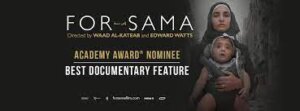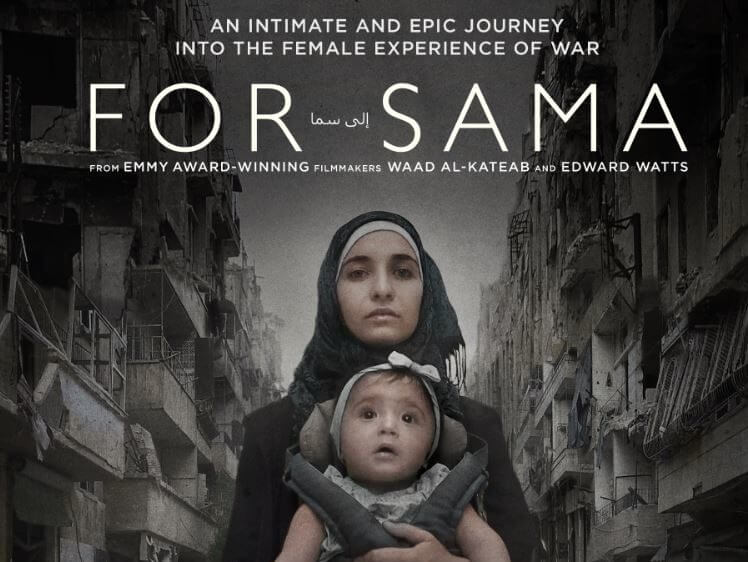By Grace Joyce
On March 9, 2022, the 2021-2022 World Cinema Series conducted a virtual discussion of the 2019 film, For Sama. Directed by Waad Al-Kateab, the film was nominated for Best Documentary Film Oscar in 2020 and won Best Documentary at the 2020 BAFTA Awards.
This intimate and heart wrenching film focuses on a young woman, Waad Al-Kataed, who moved to Aleppo, Syria for college. The story goes through the years of the uprising in Aleppo and shows her falling in love, getting married, and eventually giving birth to her baby girl, Sama, all while chaos and war take over the city around her. For Sama is unique as it provides viewers a first-hand perspective of the female experience of war. The panelists for this discussion were Dr. Saliba Sarsar, a professor in the Department of Political Science and Sociology with specializations in Palestinian-Israel relations and Middle Eastern democracy, and Dr. Sanjana Ragudaran, assistant professor in the School of Social Work with expertise in migrant experiences and race disparities. Dr. Tom Pearson, professor in the Department of History and Anthropology, introduced and moderated the discussion.
The first panelist was Dr. Sarsar, who provided background information on the events leading up to the Syrian Civil War. Syrian President Bashar al-Assad widened his elite base by concentrating the power within his family. By doing so, the Asaad family wielded immense power and gained strong political backing from parliament. Dr. Sarsar identified the five main stages of the Civil War: 1) early 2011, characterized by young protesters in Syria with graffiti against the regime who retaliated with brutal force, 2) 2012, which involved an armed insurgency from opposition groups, 3) increased activity of ISIS and other Islamist groups, 4) 2015-16, when Russian military intervention increased, and 5) the Asaad regime’s ultimate consolidated control over most of Syria and its major cities. Dr. Sarsar noted this was a major confrontation larger than any in Syria, which was marked by widespread violence against civilians. He concluded his remarks with a discussion of how this was something no child should ever have to experience, and that even during the suffering the people found a way to manage and carry on with their lives.
Dr. Ragudaran took a different approach with the film and considered how war impacts people emotionally and physically, specifically children; the presence of racial bias; and the intergenerational trauma that war causes. The children during the war did not know peace, and their systems were constantly operating on a fight or flight basis. Moreover, many of these children’s friends were dead or left behind. When children are displaced, they are removed from schooling and socializing, and also face racial biases as in many situations whites are seen as the “superior race”. This creates the need for more funding, social working, and resettlement workers not only for the children, but for all refugees. Dr. Ragudaran also offered a feminist perspective on the conflict in Syria, which is rarely shown in the context of war.

